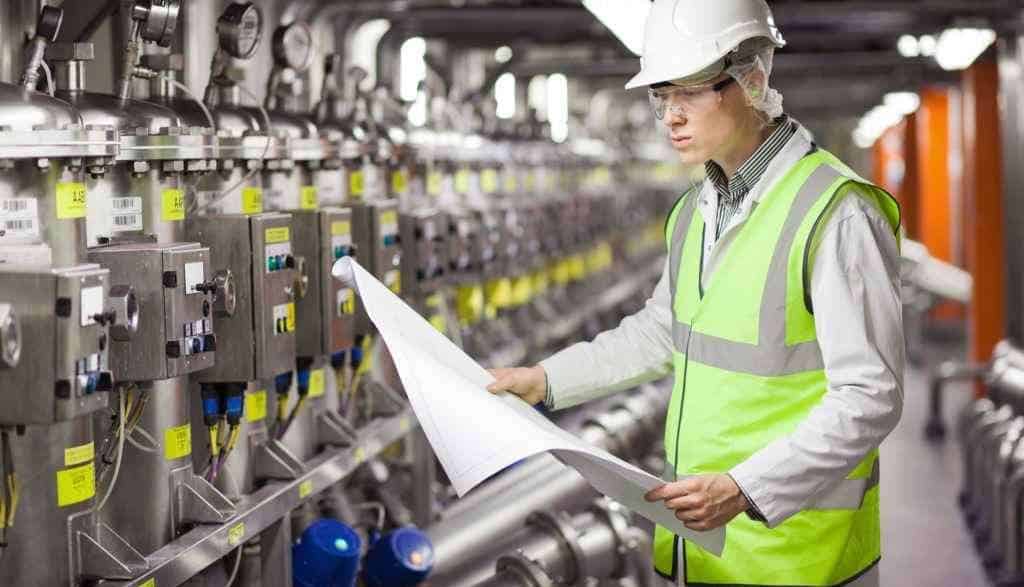Image: GSK
Facilities Engineers work in a number of indoor environments including manufacturing facilities, power stations, hospitals, and offices. They can have an extremely broad remit covering the plant maintenance or infrastructure of the building depending on the needs of the company or organization. Areas of direct responsibility might include environmental, plant, utilities, electrical engineering, civil engineering, health, safety, control and instrumentation or HVAC (heating, ventilation and air conditioning)
Some Companies Might Call This Role…
- Maintenance Engineer
- Lead Utilities Engineer
- Maintenance Systems Lead
- Quality/Environmental Engineering
- Facilities Technician
- Facilities Coordinator
- Facilities Technologist
What is Facilities Engineering?
The overall aim of facilities engineering is to ensure that routine facility utility processes are carried out in the safest, most time-efficient and cost-effective way possible. Facilities Engineers achieve this through review and modification of existing processes, as well as design and implementation of new procedures or improvements.
A Facilities Engineer can have direct responsibility for a range of facility infrastructure needs – such as HVAC, electrical engineering, EHS, energy, maintenance and civil engineering.
As well as the day-to-day running of the facility, a Facilities Engineer may have budgetary responsibilities and duties around optimizing operational efficiency. Facilities engineer may also be involved in the development of new facilities, planning and implementing the facility infrastructure and utility systems.
All tasks performed by Facilities Engineers will be in strict accordance with any internal policies and SOPs as well as any relevant external regulations. To ensure full compliance, maintaining accurate documentation for their tasks is an important part of the role.
In this role, individuals will be required to work closely with other specialists to ensure the smooth running of the facility.
What Does a Facilities Engineer do?
The specific tasks of any one facility engineering position will be highly dependant on the size of plant, what is being manufactured and the range of specialist employees. If a company has a specialist instrumentation engineer, for example, then instrumentation will then not be the direct responsibility of the Facilities Engineer.
Examples of the potential tasks of a Facilities Engineer include:
- Budgetary responsibilities
- Review and monitoring of current processes to optimize efficiency
- Scheduling of routine maintenance
- Troubleshooting any issues with the plant utility systems
- Writing of internal SOPs for relevant areas
- Analysis of potential improvements
- Design of new processes or procedures across the facility
- Oversight of improvement or installation projects
- Responsibility to ensure plant utility systems meet internal standards and external regulatory requirements
- Supervision of junior facilities staff
- Training of other staff on safety procedures
Becoming a Facilities Engineer
A Bachelor of Science (BSc) degree in mechanical engineering or a related engineering discipline is typical. If the emphasis is more on building or infrastructure maintenance, it is not uncommon to find someone with a civil engineering background in this role. Extensive plant maintenance or facilities experience can also provide a route into these senior positions without the need for any university qualification.
More recently, more universities are offering specialized facility engineering programs that combine subjects from mechanical, process, electrical and automation/ control engineering.
Typical coursework focuses on chemistry of plant processes, engineering physics, engineering management, facilities management, engineering plant operations, manufacturing processes, facilities engineering diagnostics, power generation plants, introduction to marine eng, boilers and steam plant system operations, turbines, programming applications for engineers, static properties of materials, electrical circuits, fluid mechanics, refrigeration and air conditioning, electrical machinery, instrumentation and measurement, automation, power engineering technology, dynamics, material science, electronics, thermodynamics, project management.
Facilities Engineer in the Pharmaceutical Industry
If you already work as a facilities engineer and would like to retrain to perform the same or similar role within the pharmaceutical industry, check out our 18-week Conversion Course into Engineering Roles in Pharma. This program is the quickest way to learn all you need to successfully move into a facility engineer or technician role within the pharmaceutical & medical device industry from a different industry.
Here are some typical job titles we often see advertised and that you could apply for (and depending on your previous experience);
- Facilities Engineer – ensure all preventative and corrective works on plant utilities and equipment are planned and executed.
- Lead Utilities Engineer – manage capital projects from inception to delivery and ensure plant availability is maximized.
- Maintenance Systems Lead – ownership of all preventative and corrective works on plant utilities and equipment.
- Quality/Environmental Engineering
- Facilities Technician
- Facilities Coordinator
- Facilities Technologist
What Skills Do I Need?
The ideal skill set for someone moving into facilities engineering includes:
- Organisational skills – the daily tasks can be extremely diverse. Some may be monitoring and reviewing routine plant operations, some may require project management of new initiatives, and some may require input at the very start of facility development. Prioritisation, budgetary responsibilities, and time management are all key
- Leadership or Management experience – a facilities engineer may have to manage a team of technicians
- Attention to detail – in general, the aim is to maximize efficiency and maintain safety standards. This requires the ability to notice the smallest of areas where improvements could be made
- Critical thinking – may have to troubleshoot problems within the plant and be able to consider a range of potential fixes or improvements, before deciding on the most appropriate one
- Communication skills – interaction with colleagues across the facility will generally be required, as well as routine reporting to management. Written and verbal communication skills are both extremely important
- Calm under pressure – needs to be able to make well-informed and considered decisions in times of extreme pressure, could be a key decision maker in emergency or time-critical situations
Facilities Engineer Salaries & Job Growth
Check out our salary guide for Facilities Engineer salary information local to you.
Facilities Engineer Resume Tips
As with all resumes, it’s extremely important that you tailor your Facilities Engineer resume to reflect the language used within the job advert. Where you have relevant experience or skills, use the words and phrases that the employer has used to describe them. Do not assume that someone will read similar wording and know what you mean.
Facilities Engineer roles will typically be looking for the skills previously outlined:
- Organizational skills
- Leadership or Management experience
- Attention to detail
- Critical thinking
- Communication skills
- Calm under pressure
For more help with your resume, check out these templates and this list of 30 tips to improve your resume.
Facilities Engineer Job Vacancies in Pharma
To see currently available Facilities Engineer roles in the pharmaceutical and med device industries, check our jobs boards and select Engineering in the “Jobs by Category” menu. We currently have job boards for Ireland and the UK.
24 Other Types of Pharma Job Roles
Manufacturing/Production
- Process Technician
- Process Operator
- Manufacturing Technician
- Production Operator
- Packaging Operator
- Production Supervisor
Engineering
- Process Engineer
- Manufacturing Engineer
- Instrumentation Engineer
- Project Engineer
- Automation Engineer
Maintenance
Quality
Science/Laboratory
Validation
About the Author
Donagh Fitzgerald
Head of Marketing & Product Development
Mechanical/Production Engineer
Donagh looks after the marketing and product development including the training and pedagogical elements of our programs and makes sure that all GetReskilled’s users can have a great online learning experience. Donagh has lived and worked in many countries including Ireland, America, the UK, Singapore, Hong Kong and Japan. Donagh has also served as the Program Manager for the Farmleigh Fellowship based out of Singapore.
Donagh holds Degrees in Production Engineering and Mechanical Engineering from South East Technological University, Ireland.
Claire Wilson
Content Marketing and Career Coaching
Claire runs GetReskilled’s Advanced Career Coaching Programme – our specially devised job hunting course that helps our trainees take that final step into employment by leading them through the job hunting process. She is extremely enthusiastic about helping people reach their final goal of employment in their new career path.
Claire has a BSc (Hons) in Medical Biology from Edinburgh University and spent 7 years working in the pharmaceutical and medical device industries.



Hi,
Just want to say a big thanks to all involved in the upload of this page, the info has been really useful to me I have a 4-panel interview and feel a lot more confident after reading through this.
Hi,
Thankyou for sharing this page. I just started working as Facility Engineer at an Biomedical Company. At first I was lost. But after read this page, it shows me the brighter and clearer path of what i supposed to do given my position right now. Thanks to all for this lovely sharing. Thumbs up!